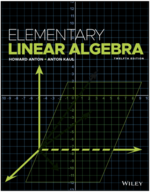?(Calculus required) If the entries of the matrix\(C=\left[\begin{array}{cccc} c_{11}(x)
Chapter 1, Problem 22(choose chapter or problem)
(Calculus required) If the entries of the matrix
\(C=\left[\begin{array}{cccc} c_{11}(x) & c_{12}(x) & \cdots & c_{1 n}(x) \\ c_{21}(x) & c_{22}(x) & \cdots & c_{2 n}(x) \\ \vdots & \vdots & & \vdots \\ c_{m 1}(x) & c_{m 2}(x) & \cdots & c_{m n}(x) \end{array}\right] \)
are differentiable functions of x, then we define
\(\frac{d C}{d x}=\left|\begin{array}{cccc} c_{11}^{\prime}(x) & c_{12}^{\prime}(x) & \cdots & c_{1 n}^{\prime}(x) \\ c_{21}^{\prime}(x) & c_{22}^{\prime}(x) & \cdots & c_{2 n}^{\prime}(x) \\ \vdots & \vdots & & \vdots \\ c_{m 1}^{\prime}(x) & c_{m 2}^{\prime}(x) & \cdots & c_{m n}^{\prime}(x) \end{array}\right| \)
Show that if the entries in 𝐴 and 𝐵 are differentiable functions of x and the sizes of the matrices are such that the stated operations can be performed, the
a. \(\frac{d}{d x}(k A)=k \frac{d A}{d x}\)
b. \(\frac{d}{d x}(A+B)=\frac{d A}{d x}+\frac{d B}{d x}\)
c. \(\frac{d}{d x}(A B)=\frac{d A}{d x} B+A \frac{d B}{d x}\)
Equation Transcription:
Text Transcription:
C=[C_11(X) C_12(X) . . . C_1n(X) C_21(X) C_22(X) . . . C_2n(X)
C_m1(X) C_m2(X) . . . C_mn(X)]
dC/dx=[C'_11(X) C'_12(X) . . . C'_1n(X) C'_21(X) C'_22(X) . . . C'_2n(X)
C'_m1(X) C'_m2(X) . . . C'_mn(X)]
d/dx(kA)=kdA/dx
d/dx(A+B)=dA/dx+dB/dx
d/dx(AB)=dA/dxB+AdB/dx
Unfortunately, we don't have that question answered yet. But you can get it answered in just 5 hours by Logging in or Becoming a subscriber.
Becoming a subscriber
Or look for another answer
